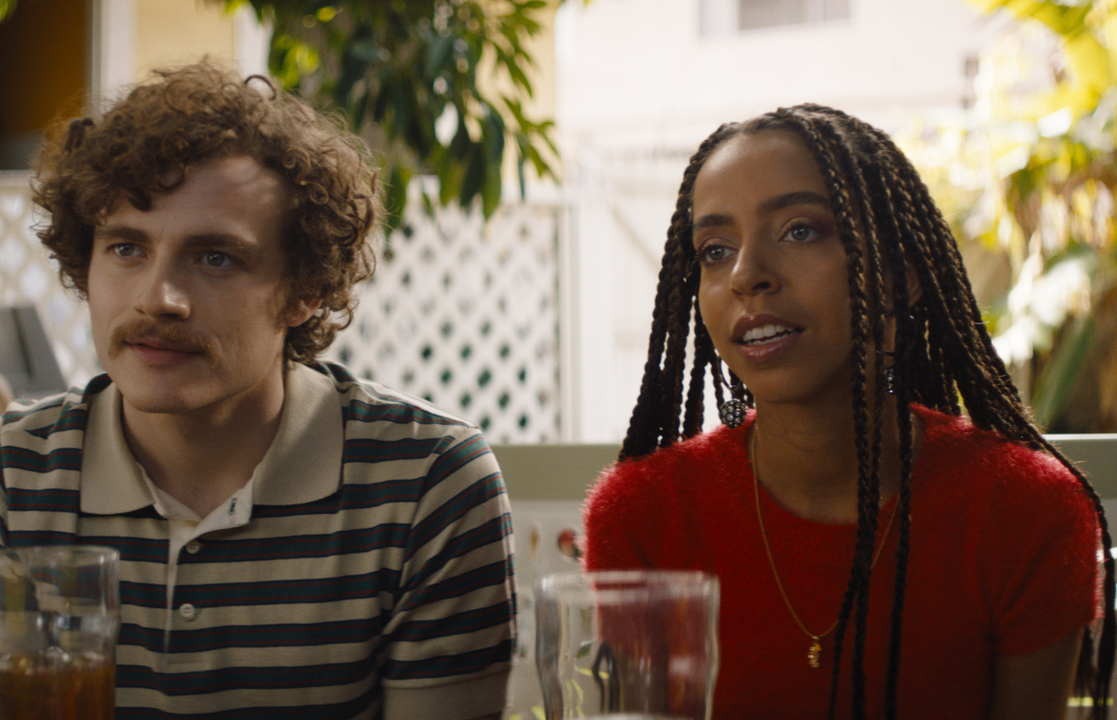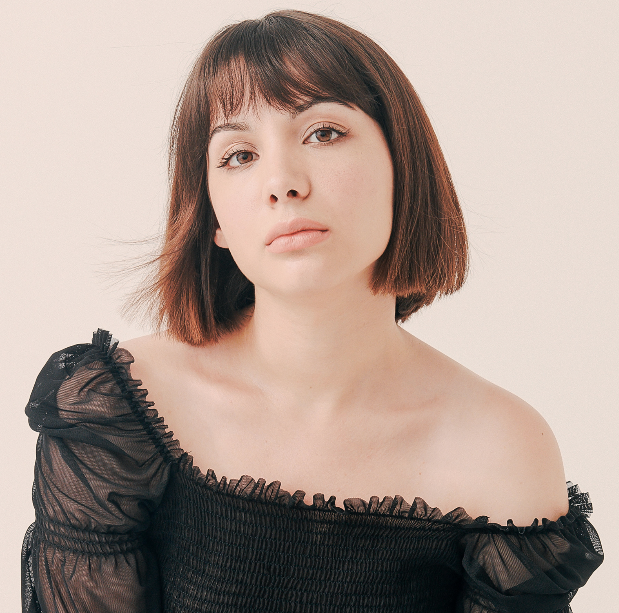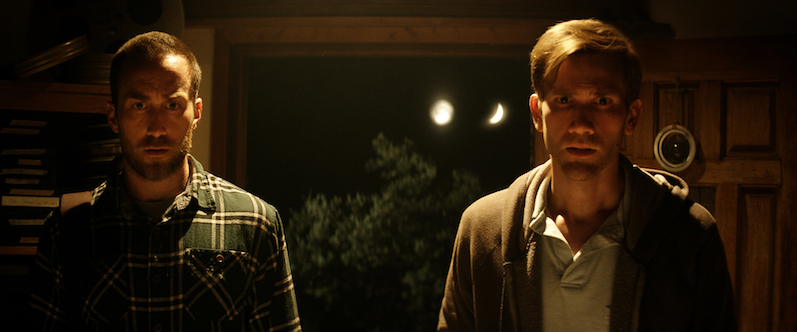HANNAH MARKS has quickly made a name for herself as an in-demand actor (in features such as Slash, Southbound, and I Used to Go Here; and series including Awkward and Dirk Gently’s Holistic Detective Agency), though she has almost just as quickly risen to the ranks of celebrated writer, director, and producer. She wrote and starred in the comedy feature Banana Split, co-wrote and co-directed the relationship dramedy After Everything, and was named one of Rolling Stone‘s 25 Under 25 artists changing the world and Forbes‘ 30 trailblazers under 30 in entertainment. She also became one of the youngest female filmmakers ever hired to helm a studio feature when she was tapped to direct the upcoming adaptation of John Green’s Turtles All the Way Down.
But first, Marks has another indie to unveil, in which she puts her own modern spin on the romantic comedy — MARK, MARY & SOME OTHER PEOPLE. The new film that she wrote, directed, and produced (and premiered at the 2021 Tribeca Film Festival) finds a pair of twentysomething newlyweds (played by Ben Rosenfield and Hayley Law) exploring the ups and downs of an open marriage.
Vertical Entertainment will release Mark, Mary & Some Other People in theaters, on demand, and digital on November 5. We spoke with the film’s writer/director/producer Hannah Marks to discuss her transition from acting to filmmaking, the difference between making indies and studio films, what she’ll be doing next, and more.
——
COLIN McCORMACK: Does your interest in writing and directing go back as far as your interest in acting, or is that something that developed over time the longer you worked as an actor?
HANNAH MARKS: I don’t think I really knew what writing and directing was when I started acting because I started at five or six, so it’s something that definitely evolved. I wanted to act because I loved movies and TV, so any way to get closer to it was what I wanted to do.
CM: Are there any specific filmmakers you worked with in your career that significantly shaped how you would eventually approach directing?
HM: That’s such a good question. I’ve been really lucky to work with a lot of great directors, especially in TV. Doing this project called The Runaways, though, which was a movie directed by Floria Sigismondi, was one of my first experiences working with a female director on a film. I love how that movie turned out. It was so, so cool and inspiring to see someone be at the helm, directing something with so much music that took place in the ‘70s, so that was an inspiration to me to see that that’s possible.
CM: When you’re juggling all these projects in various incarnations – either writing or pitching or auditioning – how do you balance or prioritize the projects that are taking up your mental space?
HM: It’s hard. I try to do it all, I try to do as much as I can and really work 24 hours a day. And it’s really been since the pandemic that I’m trying to take a step back and not stretch myself too thin and just stay focused on one thing at a time. I’ve always been trying to multitask and be a hustler because I wanted to get things done and I wanted to have success, and now it’s a good moment to take a breath and say, “It’s okay, you can prioritize one or two things and not try to do everything.”
CM: You’ve directed your own script solo – like Mark, Mary & Some Other People – you’ve co-directed one of your scripts, you’ve written scripts you didn’t direct. Do you always know upfront during that writing process how involved you want to be once production comes around?
HM: Yeah, as I’ve gotten older I definitely go in with an idea of, This is something for me to write, or, This is something for me to direct or act in. But the story dictates it, really. How can I best serve the story? How can I best serve the movie or the show, that’s how I want to be involved. I never want to be a detriment to the production because I’m not in the correct role. So the production and the story will tell you, it’ll tell you the answer. And I like getting to do all of it.
CM: Once you finish a script as a writer, what is your first step? Do you have a go-to person you always send it to for feedback or to help get the ball rolling on production?
HM: I have a lot of trust [in] my manager Zach Cox. He’s my writing and directing manager and he’s just so terrific because he knows how to balance being kind and supportive and encouraging with actual helpful criticism, which is rare, you know? Sometimes people can be too harsh and then you’re not inspired to keep going, and then sometimes people are too nice and it’s not helpful. He’s really great at balancing that and figuring out what he thinks the story needs and how I can get there. So he’s definitely my first go-to. Then my parents [laughs]. I love my parents and they might be a bit biased, but they are quick to read.
CM: For Mark, Mary… what was the initial spark that started you on the writing process for that script?
HM: I just felt like there weren’t enough rom-coms about ethical non-monogamy or polyamory or just really tackling the subject of what if we weren’t monogamous. It felt like it was something people were talking about so much but wasn’t explored that much on film yet, at least that I had seen. So to me, it was such a ripe subject and a way to really explore a lot of the feelings I had heard my friends talking about and my peers. And to have a good time, too; I love comedies and it felt like a way to have a great experience exploring something.
CM: So the characters came out of the idea of exploring that issue.
HM: Yeah, I knew I wanted to have one character be a little more experimental and progressive and the other to be a little more traditional and old-fashioned, so that was really the first spark. And I knew I wanted it to be the man that was more traditional and the woman who’d be more progressive just because we always see men in movies being like, “Let’s have a threesome, babe, and let’s bring in another girl!” And the woman’s like, “No, I don’t want to!” So I thought it would be kind of fun to just subvert more gender tropes and play around. You know, he’s the one that’s doing the emotional eating. He’s like the Bridget Jones, I suppose.
CM: [Laughs] Yeah. So once you finished a draft, how did you connect with the producers who ended up helping get the film off the ground?
HM: I made it with friends, for the most part. The people who were new on the project were a company called Crush Music; they also have Crush Pictures. They are a music management company who I had met originally to talk to them about directing music videos. And they told me they wanted to make an indie movie, so I thought this could be the perfect one to team up on because it has the music aspect of Mary’s band. So they were really instrumental in getting the movie made and also helping us with the music for the band, in particular. Otherwise, the producers were my dear friends.

CM: In casting Ben and Hayley, were they people that were already in your circle as well, or did you go through a traditional casting process for them?
HM: Neither, really. I was a fan of both of their work. I didn’t know them; I had a ton of mutual friends with both of them, but I had never met either of them. I was just a fan of theirs and kind of had a gut feeling about it. We were moving really quickly, so we just went for it with them. A lot of the other roles were cast in a more traditional way with our casting directors Amber Horn and Danielle Aufiero, who were wonderful. There were a lot of friends. It was a big mixture, which is the most fun way to do it. A lot of new people and then some veterans and just throwing everyone together and seeing what the collaboration brings.
CM: I’m sure the days go by a little easier when you’re on a set full of friends.
HM: Oh, definitely. We all really wanted it to be a good, happy experience. So often, you hear about these indie movies that are so painful and so much overtime and people are fighting or crafty is like half an apple and a bag of chips. So we really wanted to avoid that at all costs and have a really nice experience and all stay friends at the end of it. It was really all about that.
CM: For you as an actor, what is the experience like being on the other side of the casting process?
HM: It’s really eye-opening because you realize that people aren’t judging you as harshly as you judge yourself. Actors leave the room and we’re always nice, we always see the value in someone’s performance and personality, and – at least in my experience working with Amber and Danielle – it was very kind and thoughtful and supportive. It wasn’t the terrible things in your mind that you think they’re saying about you when you leave the room. So in a way, it actually made me less jaded and cynical. You would think it would go the other way, but it was very, very nice.
CM: So is that something you’ve been able to bring in when you’ve gone on auditions since you started directing?
HM: I haven’t really gotten to audition so much since I’ve been directing just because I’ve been unavailable. I’m still very much interested in acting, but time’s gotten short. But definitely, I don’t feel nervous in auditions anymore because it’s so out of our control. Also, I really realize it’s not necessarily about who’s the best actor. There are so many terrific actors, [so] it’s really about who’s the most right for the character and the tone of the project. Who has the right energy? And that’s not something you can change about yourself, it just has to be the right fit. You’re either the part or you aren’t. It doesn’t have to do with whatever your insecurities are.
CM: How many days was the shoot for Mark, Mary…?
HM: Probably sixteen? It was super short. Maybe eighteen, I don’t know now, I’m trying to remember. We wrapped at the end of January before the pandemic, so January 2020. It was a little bit ago now.
CM: And you shot in Los Angeles, which is your hometown, from what I understand?
HM: Yeah, that’s why the shoot had to be so short, so we could afford to be in LA [laughs].
CM: Obviously, there’s never enough time or money on an indie, regardless of the situation. Was there ever a time where you had to quickly pivot or problem-solve on the fly that stands out in your mind?
HM: Yeah, all the time. Just doing the Halloween party in less than a day on a movie where you don’t normally have extras and then all of a sudden you have 40 extras, that was a challenge. They’re all in costumes, all drinking. And the movie has a lot of kissing in small spaces and stuff, so thankfully it was shot before the pandemic. I don’t think it would have been possible to make it now. I guess it all seems like a dream and a breeze because now everything is so different. We had our challenges, of course, but it literally couldn’t have been made today, so I choose to forget those challenges [laughs].
CM: And on a sixteen- to eighteen-day shoot, I’m sure a lot of it is a blur anyway? It’s over before you know it.
HM: Totally. It was important for me, though, to be able to get a lot of takes. I’d rather cut scenes than not get to have takes. So I was really lucky that the crew was in support of that because we wanted to do a lot of improv. That was a huge part of the challenge of this movie, playing with improv and throwing out the script, and that requires time. And thankfully, my DP and AD were accepting of that and were like, “Okay, let’s go! Let’s do it quick!”
CM: What were some of the visual inspirations that you and your DP brought to the film?
HM: A movie we both really loved the aesthetic of that was somewhat recent was this movie called Ingrid Goes West, which I thought was really beautifully shot. They used these vintage anamorphic lenses, yet made it feel very modern and poppy and colorful. So to us, that was a good reference point because it combined the old-fashioned aesthetic with something newer, which is really what the thesis of our movie is, blending something more traditional with something more modern. That was a big reference point for us, just studying the shots in that. We didn’t really replicate how the camera moved in that movie, we kind of chose a different style of movement, but in terms of the lighting and the lenses, that was a big one.
CM: If you wrapped in January, does that mean you were in post-production when the pandemic hit?
HM: Yeah, so we edited the whole movie during COVID and over Zoom. That was really before I knew what Zoom was, it was the very beginning of it. It was a very long post process, with the world shutting down. But it also allowed us to take our time and take some risks and try things we probably wouldn’t have tried otherwise.
CM: Did it change your vision of what the next step was? Generally, you finish a film and maybe try to finish post by a certain festival submission deadline. But during that time, it was a question of “Are festivals even going to be around?” Did that let it breathe a little more than it would have if you were looking down a deadline of a traditional festival or something?
HM: We had a very unusual experience because my editor works at Hulu full-time, so we would only get to work together on the weekends. So it was a much longer process than it would have been if we had worked every day. But I wanted to work with my friend; I respect his talent so much, so we had a non-traditional experience with it. And to be honest, I never made the movie with any desired outcome in mind. I wanted to make the movie I wanted to make and have a great time and hoped other people would like it, but I wasn’t worried about film festivals or distribution or anything because I was able to have such supportive producers who were okay with whatever happened, which is very rare. Extremely rare. They gave me so much trust to try things and we all said, Whatever happens with the movie is what happens with it. And that gave us a lot of freedom.
CM: Were you able to see the film with a big group? I know it premiered at Tribeca, I don’t know if you were able to attend that or if you’ve been able to see it outdoor or indoor with a big group of people?
HM: Never, no. I was in New Zealand during Tribeca. I was really disappointed to miss it, but then I was like, I can’t complain that I’m in New Zealand! [Laughs] That’s a pretty lame complaint, “So sorry, couldn’t make it!” I was bummed to have missed the outdoor screening, especially with such a celebration of festivals coming back to North America. I have such respect for Tribeca and think it’s an amazing festival, so I was sad to miss it. But I’m going to UCLA tonight, I believe, to a screening of it and doing a Q&A, so that will be nice to see real human beings.
CM: As someone who always seems so busy, how did that work during the pandemic? Were you able to keep up your productivity or is that when things slowed down?
HM: Actually, I think I got busier because I got writing jobs, which was really cool, to be able to make money in such an uncertain time. It was really the perfect time to take on writing gigs because I was at home anyway in front of the laptop. That was something that really kept me inspired and busy. I wrote a pilot and I wrote a children’s musical, actually, which was totally new for me and super fun and challenging. So I feel like I got to grow over the course of this time.
CM: You were hired to direct an adaptation of Turtles All the Way Down. As you prep a film for a studio, is that significantly different from prepping an indie?
HM: I think it is different. You have more help, that’s for sure. There are more resources. For example, my producer and I on Mark, Mary… we were the location managers. So we were hunting down locations and begging people and it’s really nice on a studio movie to not have to do that. That’s someone else’s job. It’s nice to be able to delegate and have the experts do what they do best. But doing an indie is so fun, too, because it is fun to get to face those challenges and do jobs that aren’t maybe your own. So I think there are pros and cons to both, but it’s definitely nice to have access to [studio] resources.
CM: In terms of your career, it seems like you’ve worked in pretty much every genre and all these different mediums. Is there something you haven’t done yet – behind the camera or in front of the camera – that’s still on your career wish list?
HM: I guess I would just say I want to keep going bigger. I want to make big movies as a filmmaker. I don’t know what they will be yet, but I want to keep growing. I don’t want to limit myself, I really want to expand. I have gotten to do a lot of different genres, especially as an actor, but for me, it’s about how much scope I can get, how I can expand myself, and really challenge myself on that bigger level.
CM: With SAGindie, we obviously talk with a lot of actor-turned-filmmakers and aspiring filmmakers. Do you have advice on when you knew the time was right to take on directing? Was there one lightbulb moment?
HM: I don’t think there ever is the right time. I think you just gotta go for it, right? If you want to do it, you should try to do it. I think you’ll know because either the passion is there or it isn’t. You have to be super passionate about the topic or about the execution of the story because you’re going to spend at least two years of your life, 24/7, on it. So that’s a big takeaway for me and something I didn’t know at the beginning – how much time and energy, how much of your life will be dedicated to this. So make something that matters to you, that keeps you interested.
CM: To round things out, what’s next for you as an actor or a filmmaker? You obviously have a lot of irons in the fire, but do you have something you’re excited about?
HM: Thank you. Yeah, I’m in post right now on Don’t Make Me Go, the movie we shot in New Zealand. So I’m in the editing process of that, pretty early right now. Then my next one is Turtles All the Way Down, which we’re going to finally make, so that’s super exciting. Knock on wood! [Laughs] We’ll see, but I’m very encouraged and excited to finally tackle that, I think it’s a beautiful, beautiful book. So I’m crossing my fingers.
__
Thanks to Hannah for taking the time to talk with us about MARK, MARY & SOME OTHER PEOPLE. Follow the film on Twitter, Instagram, or Facebook.
This interview has been edited for clarity.
If you’re an independent filmmaker or know of an independent film-related topic we should write about, email blogadmin@sagindie.org for consideration.




